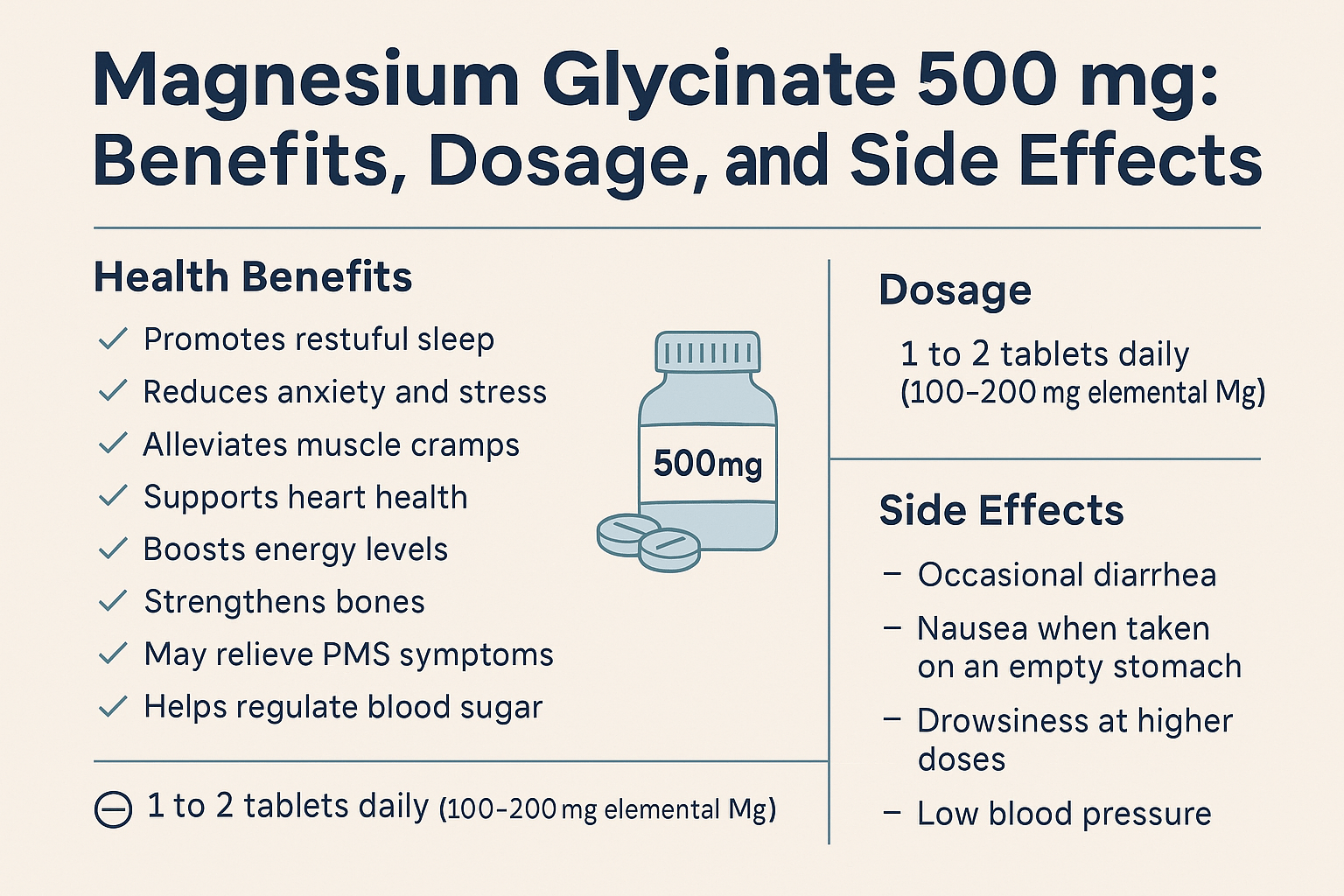Table of Contents
ToggleMagnesium Glycinate 500 mg: Benefits, Dosage, and Side Effects (Complete Guide)
Introduction:
Magnesium is vital for human health, but it’s often overlooked. A lack of magnesium can cause a lot of small health problems, like not being able to sleep well, feeling anxious, getting muscle cramps, and being exhausted all the time. Magnesium Glycinate 500 mg is one of the best and most gentle forms of magnesium, so it’s ideal for taking every day.
We’ll go over everything you need to know in this expert guide, including its benefits, the best dose, possible side effects, and how to use it safely. This supplement is essential if you want to improve your sleep, reduce anxiety, increase energy levels, or aid muscle recovery.
What is 500 mg of magnesium glycinate?
Magnesium glycinate is a chelated form of magnesium that is linked to glycine, an amino acid that calms the mind. This type is known for having a high bioavailability, which means that your body absorbs more of it than other types of magnesium, like magnesium oxide or citrate.
Most 500 mg magnesium glycinate supplements talk about the weight of the whole compound, not just the magnesium itself. For instance, depending on the brand and formulation, 500 mg of magnesium glycinate usually has 100 to 200 mg of elemental magnesium.
Magnesium glycinate is a good choice for people with sensitive stomachs or those who need to take magnesium for a long time because it is easy on the stomach.
The best health benefits of 500 mg of magnesium glycinate
Let's look at the top benefits that science and real users agree on.
1. It promotes deep and restful sleep.
Magnesium glycinate may be the best natural help for you if you have trouble falling or staying asleep. Magnesium is very important for making melatonin, the hormone that controls sleep. The amino acid glycine, which it is linked to, also makes you feel more calm. Magnesium glycinate is a strong sleep aid that doesn’t make you dependent on it.

2. Magnesium glycinate lowers anxiety, stress, and brain fog.
Low magnesium levels are strongly linked to feeling anxious, irritable, and down. Magnesium glycinate helps control GABA receptors, which are the brain’s calming neurotransmitters. This process lowers cortisol levels and makes emotions more stable.
3. Magnesium glycinate helps alleviate cramps and spasms in muscles.
Magnesium is very important for how the nerves and muscles work together. Magnesium glycinate can help with leg cramps at night, twitching muscles, or soreness after working out by relaxing muscle fibers and improving blood flow.
4. It improves heart health and helps maintain stable blood pressure.
This mineral helps keep cholesterol, blood pressure, and heart rhythm at normal levels. Magnesium helps control how calcium moves in heart cells, which is important for keeping the heart working properly.
5. Magnesium boosts your energy levels and aids in combating fatigue.
Do you feel tired even after a good night’s sleep? You might not be getting enough magnesium, which stops your cells from making ATP, the energy molecule. Magnesium glycinate helps your mitochondria work better, which can assist with chronic fatigue.
6. Magnesium, calcium, and vitamin D help strengthen bones and enhance nutrient absorption.
Magnesium, calcium, and vitamin D work together to make bones stronger. It also helps these vital nutrients enter the body and work, so it’s vital to keep your bones strong as you age.
7. It may help with PMS symptoms.
Many women say that taking magnesium glycinate regularly makes their PMS symptoms, like mood swings, bloating, and headaches, less severe. Because it relaxes muscles, it may also help with cramps during your period.
8. Magnesium helps keep blood sugar levels stable.
Magnesium helps insulin work properly and assists the body use glucose. Adding magnesium to your daily routine can help people with insulin resistance or type 2 diabetes.
9. Helps with memory and focus
Research shows that magnesium is essential for brain plasticity, which is the brain’s ability to change and make new connections. Taking magnesium glycinate as a supplement may help with learning, memory, and mental clarity.
How to Safely Take 500 mg of Magnesium Glycinate
1. When should you take it?
To sleep better, take it 30 to 60 minutes before bed.
For stress or energy support, the morning or early afternoon is a good time.
2. Should you eat it with food?
Yes, it’s safe to take on an empty stomach, but people with sensitive stomachs may want to take it with food to lower the chance of nausea or mild stomach upset.
3. How much should you take?
Most adults should get 310 to 420 mg of elemental magnesium a day.
A 500 mg magnesium glycinate tablet usually has 100 to 200 mg of elemental magnesium.
Depending on your health needs and how well you can handle it, you can safely take 1 to 2 tablets a day.
Important: If you have kidney disease, you should see a doctor before taking any magnesium supplement.
500 mg of magnesium glycinate side effects
Magnesium glycinate is one of the easiest types of magnesium to take, but some people may have
Occasional mild diarrhea or loose stools
If you take it on an empty stomach, you might feel sick.
You may feel slightly drowsy, particularly if you consume large amounts of it.
Dizziness or low blood pressure may occur, but only in rare cases or when magnesium glycinate is taken with other drugs.
Tip: Unless your doctor tells you otherwise, always stay within the safe daily limits of elemental magnesium, which is 350 mg/day from supplements.
How to Pick the Best Magnesium Glycinate Supplement
When you buy, keep an eye out for:
Nature Made, Nutra Harmony, Doctor’s Best, and Innate Vitality are all verified brands.
Check the Elemental Magnesium: Please ensure the label indicates the amount of actual elemental magnesium in the product. No fillers or additives: Look for formulas that are mostly natural and have few artificial ingredients.
Tested by a third party: This makes sure that the quality, purity, and dosage are all correct.
Bonus Tip: Check the label for “” or “fully reacted magnesium bisglycinate.” These words mean that the form is of higher quality.
Should you give Magnesium Glycinate 500 mg a try?
Magnesium glycinate 500 mg could be a game-changer if you have trouble sleeping, are anxious, have low energy, or have muscle cramps all the time. It’s easy to use, gentle on the body, and has been proven effective by science and thousands of users.
When taken regularly and as part of a balanced wellness routine, it works best. Magnesium glycinate is one of the most recommended forms of magnesium by health professionals right now if you are new to supplements or want to switch to a form that is easier for your body to use.

As always, talk to a licensed healthcare professional before taking any supplements, especially if you are pregnant or nursing, have a medical condition, or are taking medications.
Questions and Answers (FAQ)
Q1: Is it okay to take 500 mg of magnesium glycinate every day?
Yes, for most people, it’s safe to take as long as they don’t go over the daily limit. It is not laxative but gentle.
Q2: When will I see results?
Most people notice changes within 3 to 7 days of using it regularly. These changes include better sleep, less stress, or fewer cramps.
Q3: Is magnesium glycinate better than magnesium oxide or citrate?
Yes. It is easier for the body to use and it is easier on the stomach. Magnesium oxide doesn’t absorb well and can make you have diarrhea.
Q4: Is it okay to take it with calcium or vitamin D?
Of course. Magnesium works well with both of these nutrients. Some multivitamins even mix them together.
Q5: Is magnesium glycinate safe for people with sensitive stomachs?
Yes, it’s one of the least irritating types of magnesium and is often recommended for people with IBS or other gut problems.
Q6: Is magnesium glycinate good for helping me sleep?
Yes, for sure. When combined with glycine, it works especially well to calm the nervous system and improve deep sleep.
Q7: Is it safe for older people to take magnesium glycinate?
Yes. Older people often don’t get enough magnesium, but taking it can help them, especially with muscle function, memory, and sleep quality.
